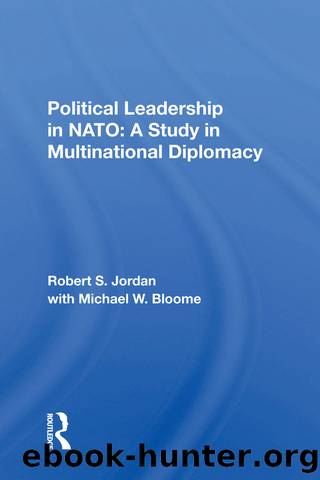Political Leadership in Nato: A Study in Multinational Diplomacy by Robert S. Jordan

Author:Robert S. Jordan [Jordan, Robert S.]
Language: eng
Format: epub
Tags: Political Science, General
ISBN: 9780891583554
Google: Lk2fDwAAQBAJ
Goodreads: 3239577
Publisher: Westview Press
Published: 1979-03-21T00:00:00+00:00
4
Manlio Brosio: A Diplomat's Diplomat, 1964â1971
Introduction1
NATO's fourth secretary-general, Manlio Brosio, was born in Turin in 1897 in moderate circumstances as the son of a merchant. Even though quiet-mannered, Brosio's intelligence nonetheless manifested itself early in his life. He enrolled in the university in his home town but left in 1916 following his country's declaration of war. Brosio then entered the military school in Caserta and later served as an Alpine artillery officer with the Italian forces, receiving two decorations for his distinguished service. Brosio, like Spaak before him, felt the personal ravages of the First World War. Captured by the Austrians, he was held in a prisoner of war camp until 1918.
Following his release, Brosio returned to Turin where he resumed his studies. By 1920 he had received his law degree and had opened his own practice. Brosio's student days were also days of political activity. He strongly opposed the fascist movement then sweeping Italy and joined the antifascist group "Rivoluzione Liberale" where he served in the political section and collaborated in antifacist publications. He also became a member of the larger "Committee Against Fascism." Following the fascist capture of government under Benito Mussolini, Brosio was imprisoned several times for his political activities and in 1926 was banned from all participation in politics.
Brosio did not strictly abide by the terms of his political ostracism, as he retained contact with several leaders of the clandestine Italian opposition, notably the philosopher and historian Benedetto Croce and Luigi Einandi, an economist who would later become president of Italy. Yet Brosio could not openly participate in politics; therefore he filled the next seventeen years of his life with an active law practice that he supplemented through the contribution of articles to professional and academic journals.2 It was also in this period of forced retirement that Brosio married his cousin, Clotilde, in 1936
Profiting from the collapse of Mussolini's regime in 1943, he joined the secret Committee of National Liberation and thus participated directly in the Italian underground resistance to the German occupation. He also helped to revive the Italian Liberal Party that, like all opposition parties, had been disbanded under Mussolini. The allied liberation of Italy in 1944 brought with it the restoration of political liberty and civilian government. Brosio, having created for himself an important position in leading political circles, participated fully by this time in governmental activity.
From 1944 to 1946, Brosio served in the first three brief cabinets of the postwar era.3 It was not as a minister, however, that Brosio earned his political reputation. Only once, as minister of defense, did he actually direct a ministry, and even then his primary responsibility was for border patrol. Brosio was appointed Italy's ambassador to the Soviet Union in 1947 and remained in that position until 1951. He personally conducted the negotiation of the Italian Peace Treaty and was largely responsible for such important achievements as the release of Italian prisoners of war, the settlement of Soviet reparations claims, and the establishment of normal diplomatic relations with the Soviet Union, which included a trade agreement between the two states.
Download
This site does not store any files on its server. We only index and link to content provided by other sites. Please contact the content providers to delete copyright contents if any and email us, we'll remove relevant links or contents immediately.
The Secret History by Donna Tartt(19088)
The Social Justice Warrior Handbook by Lisa De Pasquale(12190)
Thirteen Reasons Why by Jay Asher(8910)
This Is How You Lose Her by Junot Diaz(6887)
Weapons of Math Destruction by Cathy O'Neil(6280)
Zero to One by Peter Thiel(5802)
Beartown by Fredrik Backman(5754)
The Myth of the Strong Leader by Archie Brown(5507)
The Fire Next Time by James Baldwin(5446)
How Democracies Die by Steven Levitsky & Daniel Ziblatt(5218)
Promise Me, Dad by Joe Biden(5153)
Stone's Rules by Roger Stone(5088)
A Higher Loyalty: Truth, Lies, and Leadership by James Comey(4964)
100 Deadly Skills by Clint Emerson(4925)
Rise and Kill First by Ronen Bergman(4789)
Secrecy World by Jake Bernstein(4753)
The David Icke Guide to the Global Conspiracy (and how to end it) by David Icke(4719)
The Farm by Tom Rob Smith(4511)
The Doomsday Machine by Daniel Ellsberg(4490)
